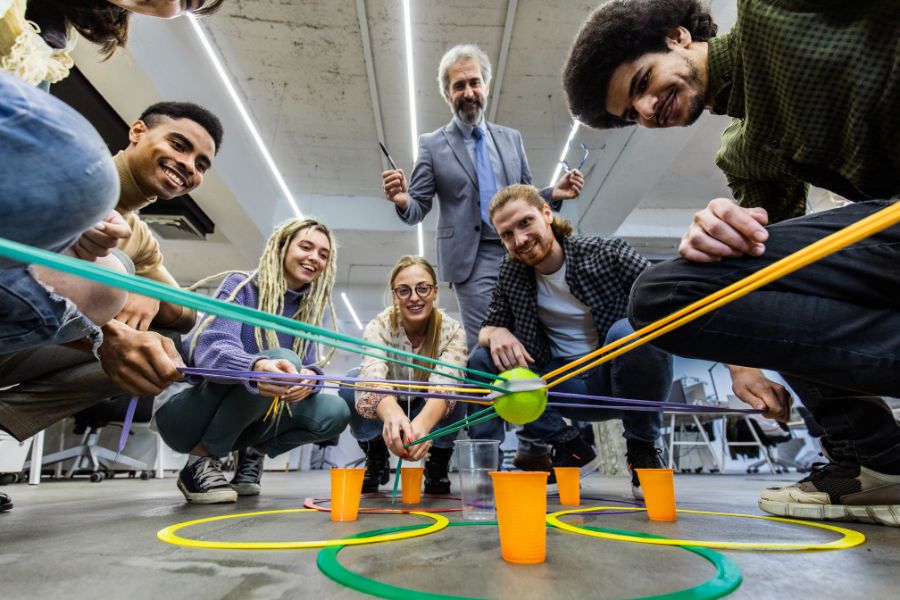Team building games are an excellent way to improve communication, foster collaboration, and boost morale within a group. Indoor team-building games are especially useful in environments where outdoor activities are not feasible, such as corporate offices, conference rooms, or educational institutions. In this article, we will explore various indoor team-building games, their benefits, and tips on organizing them effectively.
Why Indoor Team Building Games Matter
Indoor team-building games are essential for:
- Enhancing Communication: Encouraging employees to express their ideas effectively.
- Fostering Teamwork: Promoting collaboration and trust among team members.
- Improving Problem-Solving Skills: Encouraging critical thinking and creative solutions.
- Boosting Morale: Creating a fun and engaging work environment.
- Encouraging Leadership: Providing opportunities for individuals to step up and take charge.
Popular Indoor Team Building Games
Escape Room Challenge
Objective: Teams must solve puzzles and unlock clues to “escape” within a set time. How to Play:
- Create a storyline and hide clues around the room.
- Divide the participants into small teams.
- Set a timer and encourage collaboration to solve the puzzle. Benefits: Enhances problem-solving, teamwork, and time management skills.
Two Truths and a Lie
Objective: Team members share two truths and one lie about themselves, and others guess the lie. How to Play:
- Each person writes down two true facts and one false statement.
- The rest of the team tries to identify the false statement. Benefits: Improves interpersonal relationships and helps team members learn more about each other.
Office Trivia
Objective: To test knowledge about the company, industry, or fun facts. How to Play:
- Prepare a list of trivia questions.
- Divide the participants into teams and quiz them.
- Award points for correct answers. Benefits: Encourages learning, healthy competition, and company culture awareness.
Marshmallow Tower Challenge
Objective: Build the tallest tower using marshmallows and spaghetti sticks. How to Play:
- Provide teams with an equal amount of supplies.
- Set a time limit to build the tallest stable tower. Benefits: Enhances creativity, collaboration, and strategic thinking.
Blindfolded Drawing
Objective: One person describes an image, and their teammate draws it blindfolded. How to Play:
- Pair up participants, with one being blindfolded.
- The other partner describes an image without saying its name. Benefits: Enhances communication skills and teamwork.
Minefield
Objective: Navigate through an obstacle course blindfolded with a teammate guiding them.
How to Play:
- Set up obstacles in a room.
- One team member is blindfolded while another provides verbal directions. Benefits: Builds trust and improves communication.
Pictionary
Objective: Draw given words or phrases, and teammates must guess correctly. How to Play:
- Use a whiteboard or paper.
- Provide a list of words or phrases to draw.
- Set a time limit for each turn. Benefits: Encourages creativity and teamwork.
Balloon Tower
Objective: Build the tallest balloon tower using tape and balloons. How to Play:
- Provide teams with materials.
- Set a time limit to build a stable structure. Benefits: Encourages innovation and teamwork.
Storytelling Chain
Objective: Build a story one sentence at a time by each team member. How to Play:
- The first person starts a sentence.
- Each subsequent person adds to it. Benefits: Enhances listening, creativity, and collaboration.
Scavenger Hunt
Objective: Find items from a provided list within the office space. How to Play:
- Create a list of items to find.
- Set a time limit and award points for each found item. Benefits: Encourages teamwork and quick decision-making.
Human Knot
Objective: Untangle a group of people holding hands. How to Play:
- Participants form a circle and randomly hold hands.
- They must untangle without letting go. Benefits: Encourages problem-solving and cooperation.
Office Charades
Objective: Act out workplace-related scenarios without speaking. How to Play:
- Write down different office scenarios.
- Participants act them out while their team guesses. Benefits: Improves communication and fosters camaraderie.
Tower of Cups
Objective: Stack cups in a specific pattern without using hands. How to Play:
- Use strings and rubber bands to maneuver the cups.
- Set a time limit. Benefits: Promotes problem-solving and teamwork.
Debate Challenge
Objective: Engage in friendly debates on lighthearted topics. How to Play:
- Provide debate topics.
- Divide participants into teams to present their arguments. Benefits: Enhances communication and critical thinking skills.
Speed Networking
Objective: Quickly introduce yourself and share interests with as many people as possible. How to Play:
- Set a timer for each round.
- Participants rotate and talk briefly. Benefits: Encourages networking and relationship building.
Tips for Organizing Indoor Team Building Games
- Know Your Audience: Choose games that suit the interests and dynamics of your team.
- Set Clear Objectives: Define what you want to achieve from the activity.
- Create a Comfortable Environment: Ensure the space is suitable for the activities.
- Encourage Participation: Make sure everyone feels included and motivated.
- Debrief After the Games: Discuss key takeaways and how they apply to the workplace.
- Provide Incentives: Small rewards can boost engagement and enthusiasm.
Conclusion
Indoor team-building games are a fantastic way to foster collaboration, communication, and a positive work environment. Whether it’s a quick activity during a meeting or a dedicated team-building event, these games can help build stronger relationships and enhance productivity. Try incorporating some of these games into your next team-building session and watch your team grow closer and more effective!

